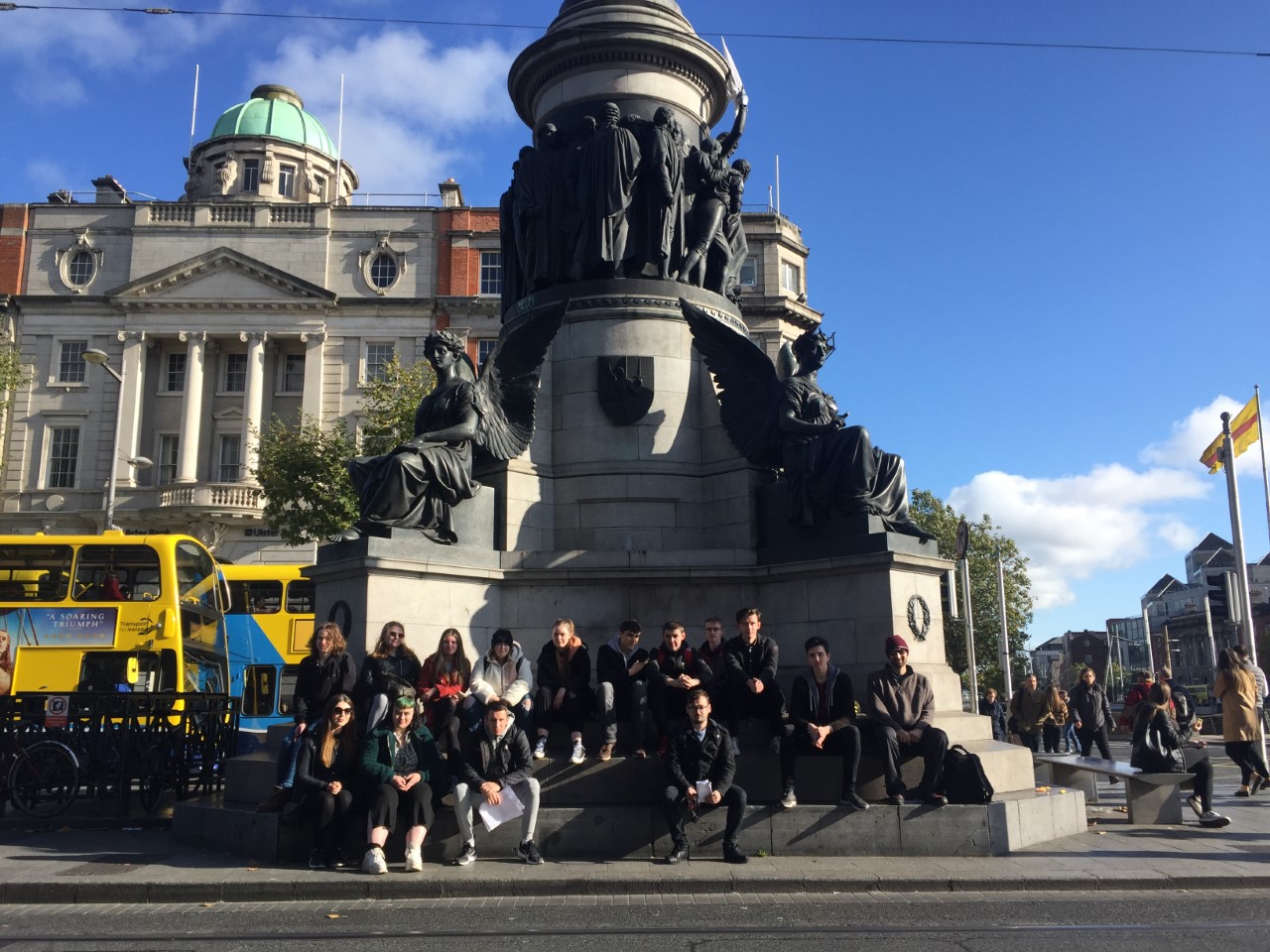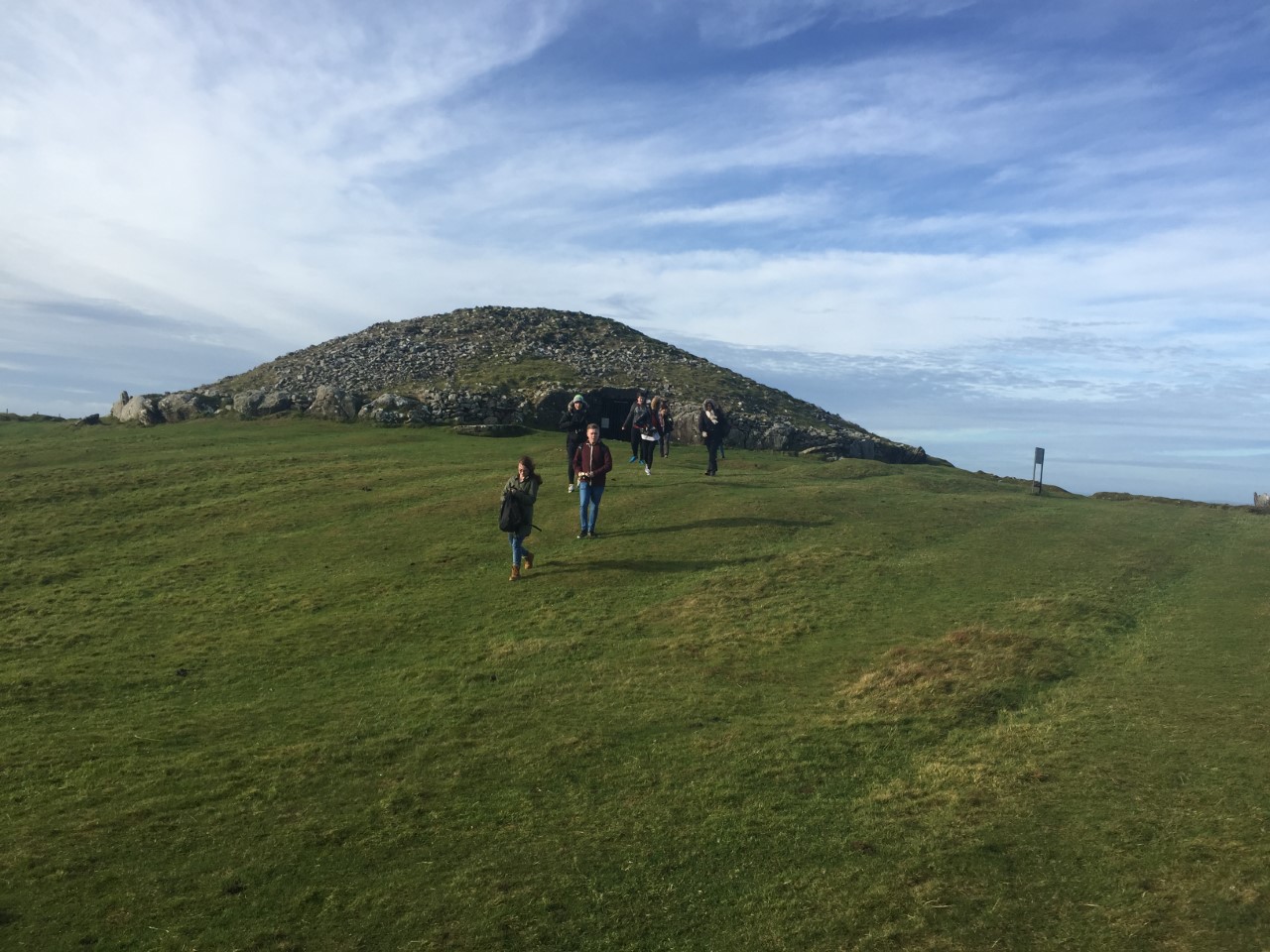Pre - University: Arts (Cultural and Heritage Studies)
Level 5 QQI Award - Cultural and Heritage Studies 5M2154

Duration
This is a Full-time One Year course which runs from Sept. to May. Exact details of the timetable will be given out to students during the induction process prior to class commencement in September.
Overview
This course provides students with solid background knowledge and skills for progression to third level and thrive in an Arts or Media Degree. This course has an excellent record of graduate progression to UCD, TCD, IADT and NUI Maynooth. Students will learn about the cultural richness of Europe and will develop strong research, journalistic-writing and analytical skills. Learning is taken beyond the classroom space, with students touring Irish cultural landmarks and examining historic artefacts. Students will be given a broad education in culture and media, which will help give clarity on what area they would like to study at Higher Education level.
Entry Requirements
One of the following:
- Leaving Certificate (LC Established, LCVP, LCA) or equivalent
- A Full Level 4 QQI/FETAC Award (or equivalent)
- For Mature Applicants (aged 21 or over) - appropriate experience will be considered in lieu of formal qualifications. Note: Mature applicants may be entitled to VTOS funding. For details about VTOS, please contact the college.
- Applicants whose first language is not English require level B1 competency on the CEFR language framework. Applicants may be required to undergo English language testing to establish their language competency.
Course Modules
- Archaeology
- Folklore and Ethnology
- Local History Research
- European Studies
- Political Studies
- Writing Skills for Journalism
- Communications
- Work Experience
Module Information
Pre - University: Arts, Culture and History
Level 5 QQI Award: Culture and Heritage Studies (5M2154)
Course Content (Module Names and Codes)
Local History Research (5N1296)
Undertake the researching and writing of local history. Learn about the sourcing of research material for the purpose of writing local history articles about individuals, events, buildings, places etc. Both primary and secondary sources will be explored through archives, libraries and digital media. Objectivity, referencing and presentation are also covered. Field trips will be arranged subject to timetable and weather.
Assessment: Assignment (30%), Project (50%), Diary (20%).
Writing Skills for Journalism (5N2435)
Use your Social Networking skills to source news and to develop ideas for feature and opinion pieces while working on structuring, style and the importance of writing for your audience. Vital elements of media law, including defamation and privacy are also included. Time will be spent writing, studying theory and engaging in discussion on current news events.
Assessment: Assignment (30%), Collection of Work (70%).
European Studies (5N1444)
Learn and understand the historical origins and evolution of the European Union. In addition to the political and economic elements of modern Europe, explore the physical geography, demographics, transport and communications systems, education and health, lifestyles, human rights and cultural diversity (architecture, performing arts, language, literature etc.) of the member states. Field trips to relevant institutions are undertaken as part of this subject.
Assessment: Project (70%), Assignment (30%).
Communications (5N0690)
This module explores the role of communication in human interaction in theory and practice. Students are facilitated to gain relevant knowledge, skills, and competence to communicate verbally and nonverbally in standard everyday tasks and work-related situations. Students will have the opportunity to develop important vocational related skills such as report writing, report reading, listening, and speaking skills (through oral presentation, interviews, group work) and modern information communication technology.
Assessment: Collection of Work (50%), Skills Demonstration (50%).
Archaeology (5N0762)
Explore Irish archaeology from the Mesolithic period through to medieval times. Learn about the growing use of scientific disciplines involved in archaeological research, such as forensic science, environmental science, relevant medical and dental disciplines, geophysical and electromagnetic surveys, experimental and reconstruction archaeology, anthropological studies, excavation techniques etc. Field trips are undertaken as part of this subject.
Assessment: Assignment (20%), Project (50%), Examination - Theory (30%).
Folklore and Ethnology (5N1274)
Study the built and material heritage of Ireland. Explore the Oral traditions such as legends, folk beliefs and customs, in addition to the music and dance repertoire unique to Ireland’s cultural heritage. Traditional crafts and daily life of the18th - 19th century is also covered. Folklore and ethnological evidence is revealed through classroom activities, research trips and practical work as part of the research.
Assessment: Project (50%), Examination - Theory (30%), Examination - Practical (20%).
Political Studies (5N1837)
Learn and understand the background and workings of the political systems in Ireland and the European Union, including the key cultural, political, social and economic issues. Gain an awareness of the centrality of politics in everyday life.
Assessment: Assignments (60%), Examination - Theory (40%).
Work Experience (5N1356)
Prepare for a work placement under supervision for a limited time. This module comprises; a skills audit, achievement audit, rights and responsibilities, vocational area study, an evaluation of work placement and future career options. A Work Placement of 10 working days must be arranged.
Assessment: Portfolio/Collection of Work (60%), Skills Demonstration (40%).
Certification
- Level 5 QQI Award Culture and Heritage Studies (5M2154)
Special Features
Throughout the year students will participate in a broad range of interesting projects, field trips, cultural visits and guided tours of national heritage sites. These include visits to the National Museum of Ireland, Collins Barracks, Kilmainham Gaol, Arbour Hill Cemetery and a walking tour of Dublin City.
Day trips include Loughcrew Cairns and Megalithic Centre (including Maggie Heaney's cottage), the Medieval Mile Museum, St. Canice's Cathedral, the Round Tower and Kilkenny castle.
In addition, students will visit Local History sites in the Dún Laoghaire area during the academic year.
This course is supported by FIT, which offers students the opportunity to acquire essential skills to gain employment. Students are given training in job interview techniques and CV preparation.
All DFEi students are provided with an M365 account, which gives them access to the tools and resources needed to deliver assessment work while attending their course. M365 Apps include Word, PowerPoint, Excel, outlook and OneDrive.
Work Experience
Students will be required to undertake a period work placement in an organisation connected to their vocational area during the academic year. Work Experience is mandatory for all of our full-time Level 5 courses. Students are required to source their own work placement but will be assisted in this by the work experience teacher. The work placement is usually for a period of 10 days or a minimum of 60 hours. Students usually find the work experience element of the course to be invaluable and should bear in mind that a successful work placement can sometimes lead to further opportunities.
Additional Information
Assessment
Assessment techniques will be used to assess the knowledge and skills that students will have achieved on successful completion of modules:
- Student Record
- Portfolio/Collection of Work
- Assignments
- Examination - Written or Practical
- Project
All assignments are submitted electronically. Therefore all students need access to a device such as a computer/laptop.
A full major award is granted on passing the relevant eight components. On successful completion of each component, you will be awarded a pass, a merit or a distinction grade. See www.qqi.ie for more details
Progression Opportunities
DFEi: Graduates may progress to the Level 6 QQI Advanced Certificate in Television and Digital Film at DFEi.
Elsewhere: Graduates are eligible to apply through the CAO and/or the Higher Education Links Scheme for entry to year one of a range of higher certificate and degree programmes, at Universities, Institutes of Technology and Technological Universities using their full QQI Level 5 major award. Places are not guaranteed in these Institutes and are subject to students meeting certain criteria. It is the students' responsibility to consult with the relevant HEI for information on the admissions process and any specific entry requirements. Students may also refer to the individual HEI prospectus or may also refer to the QQI FET section of the CAO website. www.cao.ie
Examples of CAO progression opportunities are listed below.
Progression Examples
BA Arts (DN520)
BA Humanities (DN530)
Bachelor of Civil Law (BCL) (DN600)
Bachelor of Business and Law (BBL) (DN610)
BSc Psychology (DN720)
BSc Social Sciences (DN700)
BSocSc Social Policy and Sociology (DN750)
BSc Economics (DN710)
BSc Criminology with Psychology (DN620)
University College Dublin - www.ucd.ie
BA Social Sciences and Cultural Innovation (DC238)
BA Humanities (DC009)
BA Politics (DC295)
BA Media Studies (DC291)
Dublin City University - www.dcu.ie
BA English, Media and Cultural Studies (DL821)
BA New Media Studies (DL837)
BA English and Equality Studies (DL841)
IADT, Dún Laoghaire - www.iadt.ie
BA Arts (MH101)
Bachelor of Social Science (MH107)
BA Psychology (MH106)
Maynooth University - www.nuimaynooth.ie
BA Arts (CK101)
Bachelor of Social Science (CK102)
BSc Government and Political Science (CK122)
Bachelor of Law and Business (BCL) (CK307)
University College Cork - www.ucc.ie
BA English Studies TR023
BA European Studies TR024
BA History TR003
BA Classics, Ancient History and Archaeology TR021
BA Political Science and Geography TR328
BA Sociology/Social Policy TR759
Trinity College Dublin - www.tcd.ie
Career Paths
Graduates may seek employment in heritage centres, museums, archives and tourist centres. Graduates may also choose to work as arts officers, curators or conservationists. Graduates will find this course to be an ideal grounding from which to progress to an Arts or Media Degree and subsequent teaching qualification.
Thank You
we will be in touch shortly
 “
“
Abrile Sammartino
Class of 2023
Studying French and History in UCD
I chose to do this course because I knew I wanted to study history and I saw this course had links to University. The teachers were great, always helpful and approachable. I also liked the…
Read More ”Abrile Sammartino
Class of 2023
Studying French and History in UCD
I chose to do this course because I knew I wanted to study history and I saw this course had links to University. The teachers were great, always helpful and approachable. I also liked the small classes and I got to know my class really well.











